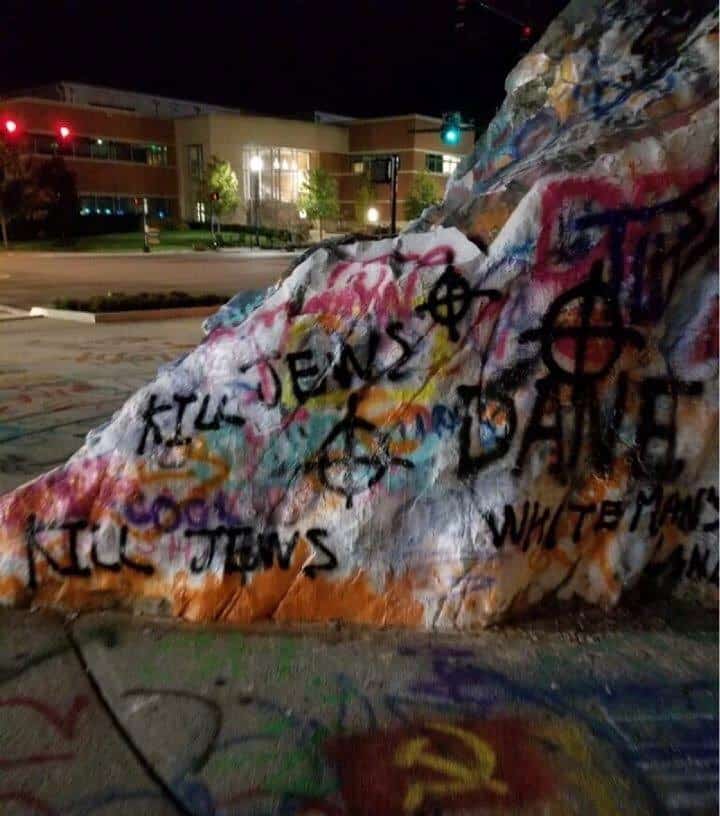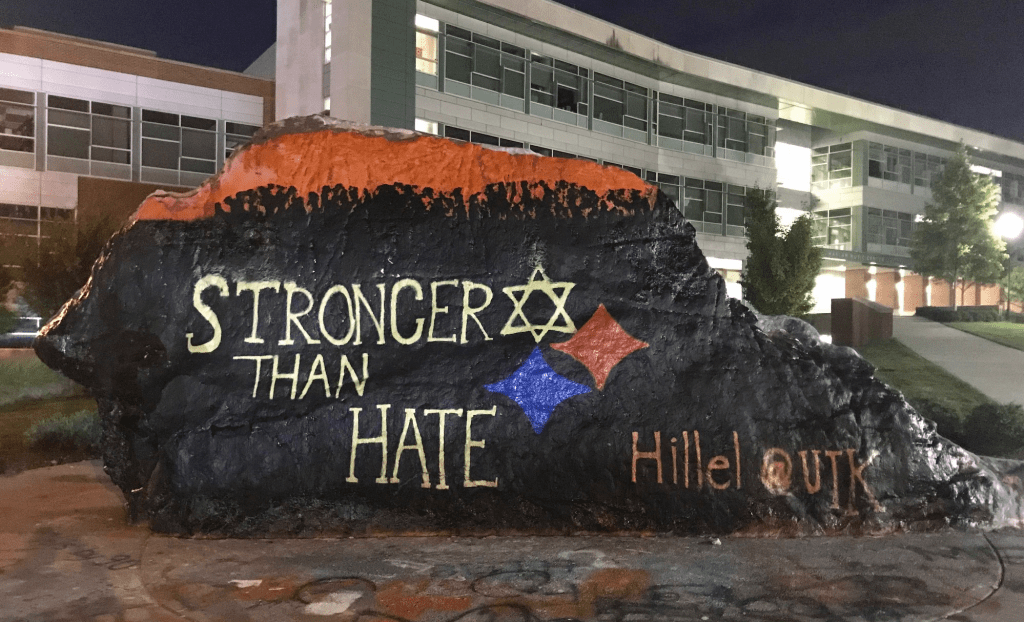Earlier this month, violent anti-Semitic messages and imagery were twice spray-painted onto the Rock, a beloved centerpiece of the University of Tennessee Knoxville campus. When the UTK administration responded with a mild message of admonishment, Jews across the state of Tennessee were disappointed and confused by the University’s reluctance to directly label the anti-Semitism and offer any clear plan to address the incidents with students, faculty, and staff and create a plan to prevent such hateful acts from happening again.
Under the coordination of Jewish Community Partners leadership, the Jewish Federations of Tennessee joined together to prepare a letter for UT President Randy Boyd and UTK Chancellor Wayne Davis, which was sent last week. A portion of the letter reads: 
We appreciate the statements that have been issued by Chancellor Davis and Dean of Students Dr. Shea Kidd-Houze and the steps the university has taken in the wake of these two incidents. And, we recognize that messages on the Rock may fall under protected speech, a right that we, too, hold sacrosanct. However, “kill Jews” raises the stakes, and Jewish students, faculty and staff have rights as well – including the right to a hate-free campus where they feel safe and secure.
We expect UTK and the entire University of Tennessee system to speak out against the “kill Jews” message in the strongest of terms and to take steps to make clear to the haters and inciters in Knoxville and beyond that their rhetoric not only does not represent the values of the campus but also are vile, shameful and loathsome. Anti-Semitism is a specific form of hate and in order to provide genuine support to the UT Jewish community, the hate needs to be specifically condemned; the administration needs to denounce anti-Semitism specifically, not just “hate.”
UT’s response was quick, and appropriate. Today, Jewish Community Partners/Memphis Jewish Federation received the following letter, signed by UT President Randy Boyd and UTK Chancellor Wayne Davis.
November 19, 2018
Thank you for your letter dated November 14. We both share your concerns, and we recognize the feelings of fear, anger, and worry that you have expressed on behalf of your respective communities.
As was communicated to our Knoxville campus community in an email on Friday, hate does not belong on our campus. Twice now, anti-Semitic messages have been painted on the Rock in the heart of our campus. These messages are abhorrent and are antithetical to our Volunteer spirit. As a university, we are committed to standing up for Jewish members of our community who feel threatened and intimidated by these vile incidents.
Our flagship campus has taken steps to increase security in light of these messages, especially since the escalation between the first and second incident, whereby, as you note, the threat of “kill Jews” was painted on the Rock. UT
Police have reviewed security footage from the incidents and have been in contact with state and federal officials to share available information. They have increased their physical presence at the Rock and at specific events and locations where they know Jewish students are gathered.
Following the first incident at the Rock, the chancellor’s office hosted a meeting of students, faculty members, and local community leaders. During that meeting, we discussed a number of ways we could support members of our Jewish community. Much of the conversation was related to their safety and security. Vice Chancellor for Student Life Vince Carilli, Dean of Students Shea Kidd-Houze, and Police Chief Troy Lane have stayed in contact with students, faculty, and staff and will remain actively engaged in providing them with support.
Last week, members of the chancellor’s cabinet engaged in a series of small-group discussions about the underlying cultural issues laid bare by these recent anti-Semitic incidents. Four themes emerged from those discussions: Safety and Security; Education; Coordination of Efforts; and Ongoing Dialogue. We have outlined these themes to our campus and are committed to putting action behind our words.
Your letter eloquently recommends the need for a thoughtful, strategic healing process. As part of our commitment to education and dialogue in this moment, we plan to organize a series of lectures, seminars, or colloquiums to address issues around anti-Semitism and hate. We will find opportunities to engage in open discussion about these difficult topics. We are also committed to continued engagement with our campus’ Jewish communities to ensure their concerns are heard and their needs are supported.
We are stronger together as Volunteers—not in spite of our difference, but because of them. The values and perspectives of everyone, including members of the Jewish community, are integral to this campus and to our statewide University of Tennessee System. We will continue to do everything we can to ensure Rocky Top and every UT System campus and institute are places where everyone feels safe and welcome.
Sincerely,
Incoming Interim President Randy Boyd
Interim Chancellor Wayne Davis
The letter to Tennessee Federations was one of two statements released by the University after our letter was sent. Last Friday, the Office of the Chancellor sent this announcement to students, faculty, staff, alumni, boosters, and others. It’s also posted on the University’s website.
Together as Volunteers
Dear Volunteers,
We are writing in response to recent hateful acts intended to threaten and divide our campus community.
Hate does not belong on our campus. Anti-Semitism, racism, homophobia, and misogyny are harmful to us all and run counter to everything it means to be a Volunteer. We stand with those of you who feel threatened and intimidated in this moment and with those of you who feel that their university has let them down in recent years.
This is about more than recent incidents at the Rock. Scrawled messages of intolerance and hate are symptoms of broader underlying issues that we recognize need to be addressed in meaningful, sustained ways.
As an administration, we have spent this week focused on finding ways to address these underlying issues. We dedicated much of that time to engaging with and listening to students, faculty, and staff in a series of small-group discussions. We asked for openness and honesty in these conversations, and we worked hard to offer the same in return.
We asked what actions and solutions would be most meaningful as we work toward a more inclusive campus. A few themes emerged from these conversations:
Safety & Security
Campus safety is our top priority. UTPD has taken some immediate steps to respond to the specific security concerns of the past few weeks, including an increased physical presence in the area around the Rock. Continued improvements in the department’s community liaison program will help connect police with our community leaders and ensure that our officers are there for you when and how you need them. We encourage everyone to download the LiveSafe app and use it to connect with UTPD and other campus resources.
Feeling safe is also about knowing you belong. We are committed to better connecting members of our campus with one another and to investing in programs and offices that support our fellow Volunteers in difficult times.
Education
It is important to connect our diversity and inclusion efforts to our core mission of education. There is great interest in organizing a series of lectures, seminars, or colloquiums to address issues brought to bear by hate speech. Curriculum materials and learning modules are also desired, along with learning opportunities for faculty, staff, and students. We will build knowledge and bring an educational focus to this work.
Coordination of Efforts
A lot of good work is being done on campus to advance our diversity and inclusion priorities. However, these efforts are decentralized and often uncoordinated. Events are often poorly attended and program organizers feel unsupported. We recognize that long-term structural improvements are needed, and we are working toward that goal. In the short term, we will bring these resources and opportunities together in ways that make them more accessible and visible.
Ongoing Dialogue
We need to talk to and hear from one another. Many of you have suggested town halls and discussion forums as effective means for building a more open and welcoming culture. There is also a need for ongoing communication efforts that allow every individual to have a voice in shaping our community. We will find ways in the coming months to facilitate more thoughtful dialogue and discussion.
It is important to us, the chancellor’s cabinet, that we acknowledge the above and be held accountable. We ask for your continued guidance and collaboration as we do the work needed to put these words into action.
Let’s continue to stand with one another, together as Volunteers.
Sincerely,
Wayne T. Davis, Interim Chancellor
Chip Bryant, Vice Chancellor for Advancement
Vincent Carilli, Vice Chancellor for Student Life
Chris Cimino, Senior Vice Chancellor for Finance and Administration
Phillip Fulmer, Director of Athletics
David Manderscheid, Provost and Senior Vice Chancellor
Robert Nobles, Interim Vice Chancellor for Research

One response to “University of Tennessee Speaks Out Against Anti-Semitism”
This is a good start and must be applauded. However people who do such things often understand only the consequences of their actions when they are made to suffer from their behavior.
What are the intended consequences when the perpetrators are caught and what will be their punishment? Deterrence unfortunately must be made to play a role with such abhorrent individuals.